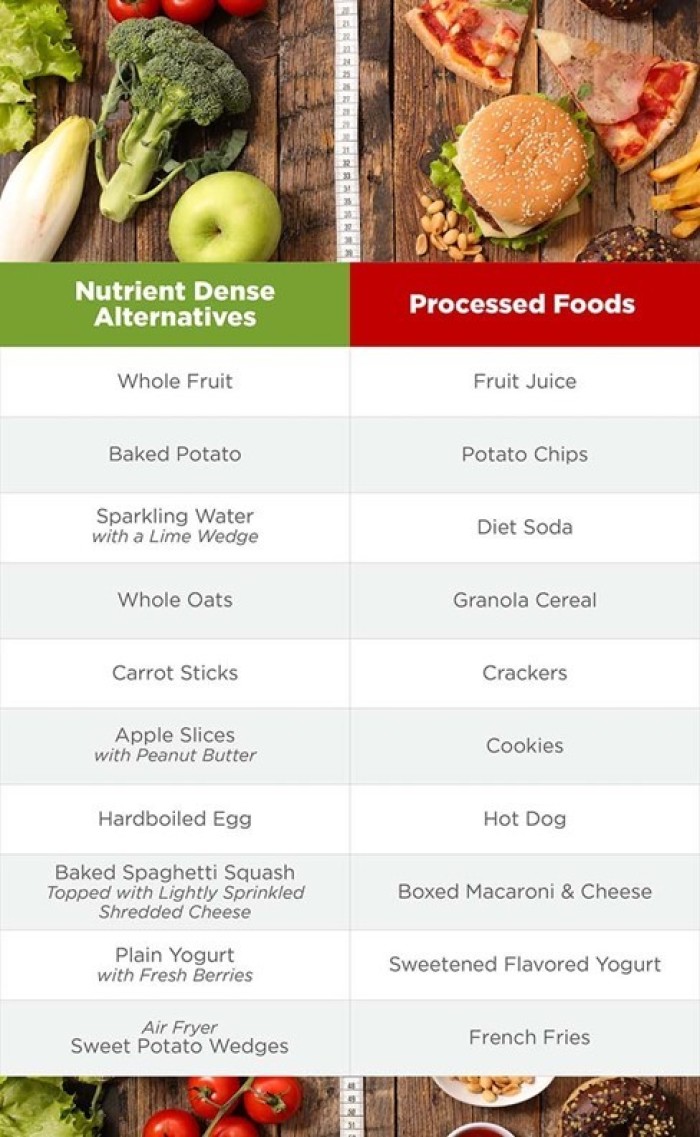5 tips for raising healthy kids in a food processed world

Ultra-processed foods now account for two-thirds of calories in the diets of children and teens, according to new medical research.
This is not surprising if you look around the aisles in the grocery store or observe the lines at fast food restaurants; but it is concerning. Strong evidence shows that a higher intake of ultra-processed foods raises the risk of obesity by 55%, sleep disorders by 41%, type 2 diabetes by 40% and depression by 20%.
Ultra-processed foods are defined as “industrial formulations of food substances (oils, fats, sugars, starch, and protein isolates) that contain little or no whole foods and typically include flavorings, colorings, emulsifiers, and other cosmetic additives.
Sounds delicious right? Not really, but we eat them all the time.
Top offenders in the category of ultra-processed foods include carbonated soft drinks, packaged snacks, candy, ice cream, mass-produced bread, cookies, pastries, breakfast cereals, packaged pizza, chicken nuggets, hot dogs, sausages, and other processed meats.
Gulp. What’s a parent to do in this fast-paced world of convenience foods?
Progress over perfection
For most, a realistic and achievable goal is not to go from 100 to zero processed foods over night, but rather to focus on simply adding more whole foods gradually. The USDA Dietary Guidelines recommend that at least 85% of your total calories per day come from whole, nutrient-dense foods. That is a good initial goal to aim for. Small steps to get there might include eating at home more often, pre-making healthier snack swaps, and moving the whole food items to the front of the fridge or pantry. These small habits turn into big progress toward the ultimate goal of less processed foods.
Try some of these easy nutrient-dense swaps to get started:

5 Tips for raising healthy kids
1. Be a role model
For good or for bad, your kids are watching! Research shows that kids tend to model the eating habits of their parents. They are observing and learning (even if they aren’t doing it just yet). This is good news to me because I often feel like the healthy food I serve goes uneaten or I receive a lot of moaning and groaning over it. But in the long run, cooking healthy food and eating healthy food myself will influence my kids’ choices later on. Sometimes it’s not what we say, but what we model that speaks volumes!
I will note that modeling a poor diet or a new “fad diet” every other month will equally influence your child’s relationship with food. Most doctors and dietitians don't recommend putting your child on a “diet.” Using the word diet and overly restricting food or calorie intake can lead to a lifelong cycle of unhealthy dieting. Instead, focus on what you eat by providing more healthy whole foods rather than processed foods. Prepare as many meals as you can at home with whole ingredients, limit sugary beverages, and use portion containers for snacks.
“Train up a child in the way he should go, even when he is old he will not depart from it” (Proverbs 22:6)
2. Plan ahead
Eating healthy starts with a good plan. Without a plan for the week, odds are fast food and last-minute convenience foods will be the default. Another way to model healthy eating is to involve your children in the meal-planning process. Let them help choose recipes for the week, brainstorm healthy snack options, make a grocery list together, and allow them to pick out their favorite fruits and vegetables in the produce section or the farmer’s market.
3. Meal prep
A designated “meal preparation time” each week, perhaps on Sunday afternoon, will make your week run more smoothly. Taking a few hours to chop fresh vegetables or prepare a healthy crock pot, pressure cooker, or frozen meals can make all the difference in the nutrition of your family mid-week. Better yet, ask the kids to help out! Doing the prep work ahead of time allows you to heat and serve healthy meals quickly amid busy schedules.
4. Eat together
Family meals are a time when adults and children can talk. Aim to provide a calm, pleasant atmosphere where children feel encouraged to try new foods and share their thoughts. Family meals improve nutrition, promote family unity, and enhance success at school. It doesn’t have to be fancy, just try to serve a lean protein, one or two vegetables (or a garden salad), and a whole grain or fresh fruit. Choose a realistic goal for the number of family dinners you can eat together each week.
5. Stay active
Healthy kids stay active. It doesn’t have to be structured, though some parents favor the benefit of being held accountable to a set schedule. However, free play outside, casual family walks after dinner, and fun kid fitness videos in the living room work as well. As parents, we have control over how far away we park the car and if we take the stairs instead of the elevator. This takes commitment on our part, but we were also given the privilege of raising healthy kids in God’s image.
Another huge factor in raising healthy kids is limiting screen time. Studies have shown that the rate of obesity is 8.3 times greater for children who watch television for five hours a day versus children who watch television for two hours or less per day. (This includes video games!)
There are several concerns with too much screen time. First, it fosters inactivity. Turn off the device and go for a bike ride or to a playground instead. Second, being allowed to watch electronics late at night or in a bedroom leads to decreased sleep, which can also play a factor in obesity.
Becoming aware of how much we can play a role in our children's health should not feel burdensome, but empowering. Much of childhood obesity can be controlled with intentional lifestyle changes, and parents do have a responsibility to steer kids toward good choices. For our own and our children’s health, it is important to lead by example and direct our children into healthy, faithful lives, both physically and spiritually.
“Let us not become weary in doing good, for at the proper time we will reap a harvest if we do not give up” (Galatians 6:9).
Megan Moore is a Registered Dietitian Nutritionist and Certified Diabetes Educator who has been in practice since 2004 and has had the privilege to serve in Christian Care Ministry’s Health & Wellness Department since 2019. She earned a Bachelor of Science in Dietetics from Texas Tech University and completed a dietetic internship at Vanderbilt University. She is a Certified Diabetes Care and Education Specialist as well as a Certified Personal Trainer. Her main role is to advise and equip our health coaches with the most up-to-date and evidence-based nutrition information. She is passionate about using her God-given gifts and experience to teach others proper nutrition and help them make it a practical part of their everyday healthy lifestyle.




























